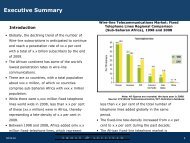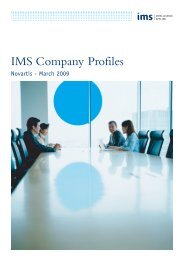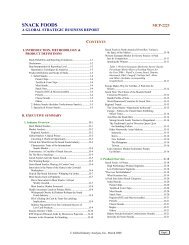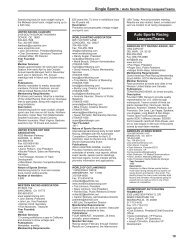the RUSSIA oil & gas competitive intelligence report - Report Buyer
the RUSSIA oil & gas competitive intelligence report - Report Buyer
the RUSSIA oil & gas competitive intelligence report - Report Buyer
You also want an ePaper? Increase the reach of your titles
YUMPU automatically turns print PDFs into web optimized ePapers that Google loves.
Russia Oil and Gas Competitive Intelligence <strong>Report</strong> 2010<br />
look at ways of transporting <strong>gas</strong> from Vladivostok to Japan, with additional deals likely to be signed in<br />
future.<br />
Gas Transit<br />
Executives from US <strong>oil</strong> majors have accompanied US President Barack Obama on his state visit to<br />
Moscow in July 2009, holding negotiations over expanding <strong>the</strong>ir presence in Russia. Neil Duffin, head of<br />
ExxonMobil project development unit, told Reuters during <strong>the</strong> trip that <strong>the</strong> company wanted Russia to<br />
make sweetening amendments to its subs<strong>oil</strong> law.<br />
Ukraine<br />
As a result of pricing, payment and transit disagreements, Russia cut off <strong>gas</strong> supplies to Ukraine on<br />
January 1 2009, causing a knock-on effect on European flows by January 7. Bitter wrangling between<br />
Moscow and Kiev ensued while supply disruptions in Eastern and south-eastern Europe reached crisis<br />
point. After a number of false starts, <strong>the</strong> flow of <strong>gas</strong> was eventually restored on January 20. Tense<br />
negotiations between <strong>the</strong> two countries over <strong>gas</strong>-related debts and prices continued throughout 2009<br />
before an uneasy truce between Prime Minister Vladimir Putin and his Ukrainian counterpart Yulia<br />
Tymoshenko was established in November of that year. While <strong>the</strong> likelihood of a new <strong>gas</strong> supply cut in<br />
<strong>the</strong> winter of 2009/10 is significantly lower, <strong>the</strong> reputations of both countries as a reliable energy supplier<br />
and a transit state respectively have taken a battering, and <strong>the</strong> dispute has encouraged <strong>the</strong> EU to accelerate<br />
its <strong>gas</strong> supply diversification programme.<br />
Gazprom and Ukraine's state-owned Naftogaz in November 2009 agreed to reduce Ukraine's <strong>gas</strong> imports<br />
in 2010 to 33.75bcm, down from <strong>the</strong> previously contracted 52bcm for that year. It was also agreed that<br />
Ukraine would not be fined for buying less <strong>gas</strong> in 2009. Between January and October 2009, Ukraine is<br />
said to have imported just 18.85bcm compared with <strong>the</strong> contracted 31.7bcm, according to Gazprom. Over<br />
2009, Ukraine had agreed to buy a total of 42bcm. Fur<strong>the</strong>rmore, Russia had agreed to increase <strong>the</strong> transit<br />
fees it pays Ukraine by 60% in 2010. In 2009, transit fees stood at US$1.70 per mcm per 100km.<br />
While <strong>the</strong> actual <strong>gas</strong> prices have not been released, Tymoshenko said that <strong>the</strong> <strong>gas</strong> price Ukraine pays 'will<br />
be almost <strong>the</strong> same in 2010 as it [was] in 2009'. Fur<strong>the</strong>r details on <strong>the</strong> <strong>gas</strong> price and <strong>the</strong> transit fees<br />
Ukraine and Russia will pay respectively in 2010 have not been released. In January 2009, Putin and<br />
Tymoshenko agreed that in 2009 Ukraine would receive a 20% discount on European market prices in<br />
return for maintaining transit fees at <strong>the</strong> same rate as in 2008, with Ukraine to start paying European-level<br />
prices and for transit fees also to reach market levels as of January 1 2010. It is unclear whe<strong>the</strong>r<br />
Tymoshenko’s comment means that <strong>the</strong> absolute price Ukraine will pay for <strong>gas</strong> imports in 2010 will<br />
remain more or less <strong>the</strong> same or whe<strong>the</strong>r <strong>the</strong> same 20%-discount principle will continue to apply. The<br />
price that Gazprom charged Ukraine in Q109 was US$360/mcm, almost exactly double <strong>the</strong><br />
US$179.50/mcm Ukraine paid in 2008.<br />
© Business Monitor International Ltd Page 14









